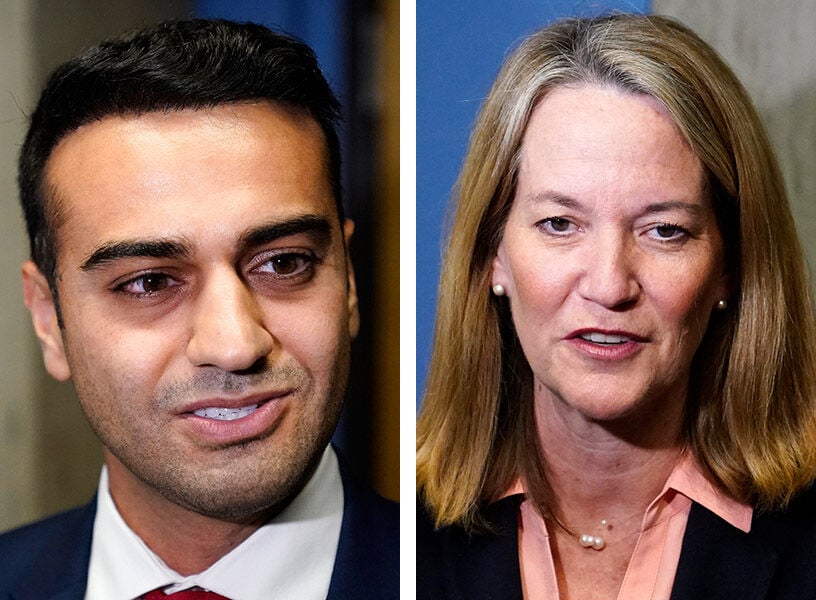PHOENIX — The Republican who lost last year’s race for Arizona attorney general wants a court to set a briefing schedule for a new trial as he seeks to overturn Democrat Kris Mayes’ victory — even though the judge has yet to rule if he deserves one.
The new filing from Abe Hamadeh’s attorneys indicates he is growing impatient at delays in a decision. They are asking Mohave County Superior Court Judge Lee Jantzen to hold a scheduling conference to set deadlines for pre-trial matters. They cite a court rule that says courts “must’’ set a hearing if a litigant requests one.
The filing was signed by attorney Jennifer Wright, one of several lawyers representing Hamadeh as he continues his efforts to overturn the closest statewide election in Arizona history. An automatic recount showed Mayes outpolled Hamadeh by just 280 votes in November, down from a 511-vote victory she had after the initial count.
Before Mayes took office, Wright ran Republican former Attorney General Mark Brnovich’s Election Integrity Unit.
She noted the request to Jantzen is unusual, but said it is important because if Hamadeh prevails after a new trial, Mayes would be ousted and replaced by him.
“Plaintiffs understand that this court has not yet ruled on their motion for a new trial and do not presume what this court may determine is appropriate and just,’’ Wright wrote. She said, though, that setting the deadlines would shorten “the period of uncertainty for the people of Arizona as to who was rightfully elected by the voters as the true attorney general of the state in the November 2022, general election.’’
There’s likely a more subtle reason for the filing, according to an election law attorney not involved in the case.
“It can be seen in some cases as a wink and a nod indication or request for a court to expedite a ruling on a pending subject,’’ said Eric Spencer, a Phoenix election attorney and former state elections director who is not affiliated with this case. “It’s a totally permissible way to put something in a court’s in-box that might have the incidental effect of speeding up another decision.’’
He lost in his first trial
Hamadeh first filed suit a month after the 2022 general election to set aside its results. Jantzen ruled against Hamadeh’s original election challenge in December, saying he failed to prove he received more votes than Mayes.
What has kept the case alive is the automatic recount in which about 500 uncounted ballots were found in Pinal County. Hamadeh picked up 392 of those.
That still wasn’t enough to close the gap with Mayes, who was declared the winner by the 280-vote margin statewide out of more than 2.5 million ballots cast.
Pinal County officials have since blamed the disparity on human error.
Attorneys for the GOP contender, in seeking a new trial, argued that now-Gov. Katie Hobbs did not disclose the recount results during the original December trial in Hamadeh’s case. Hobbs, a Democrat, was at the time secretary of state, Arizona’s top election official.
Wright also argued that ballots cast by more than 1,000 people weren’t counted because of problems with their voter registrations.
She also wants to examine ballots that did not show a vote in the attorney general’s race to determine if there actually was a vote for Hamadeh.
That’s crucial because more than 50,000 ballots in Maricopa County showed so-called “undervotes’’ in the attorney general’s race, meaning voters made choices in other races but, according to the machine tallies, skipped that race. Hamadeh’s attorneys say with a race so tight, the public and Hamadeh deserve to closely scrutinize those ballots to ensure Mayes was truly the victor.
All that led to a May 16 hearing where Hamadeh’s attorneys made their case for a do-over of the December trial.
Mayes’ side says he has no evidence
Hobbs’ lawyers, those for Mayes and attorneys for Maricopa County say Hamadeh is wrong on the law and facts and urged Jantzen to throw out the attempt to force another trial. As to his claim that the recount results were hidden, they said Hobbs was precluded from disclosing those findings before they were revealed by a judge.
They told Jantzen at the hearing that Hamadeh and his lawyers were fishing and had no actual evidence to back his claims.
“Instead, their argument before this court boils down to: ‘The election was close. If you let us keep looking, we might find something,’’’ Mayes’ attorney Alexis Danneman told the judge.
At the conclusion of the May 16 hearing the judge said he hoped to have a ruling on the new trial request “within the next couple of weeks.’’
That hasn’t happened. Under the rules that govern state courts, he has 60 days to rule on the case, meaning a ruling must be issued by mid-July.
New trial would be highly unusual
Spencer, who said he has not reviewed the new court filings, said a ruling in Hamadeh’s favor in his new trial request could up-end decades-old rules for contesting election results.
State law puts incredibly fast deadlines on election challenges so that they are concluded in the two months following an election and the public and candidate have certainty about the results.
“You go to court with what you’ve got at the time and those issues are all settled within weeks of when the canvas is conducted,’’ something that occurred in early December, Spencer said.
“But if this motion for new trial succeeds and discovery is conducted, then it looks like the litigants have figured out a way to sort of punt these issues months down the road,’’ he said. Potentially more significant, Spencer said, it would allow Hamadeh to “conduct the kind of fulsome discovery that normally isn’t available’’ in the usually expedited election cases.
“And they will have found a loophole in existing election contest practice,’’ he said.





